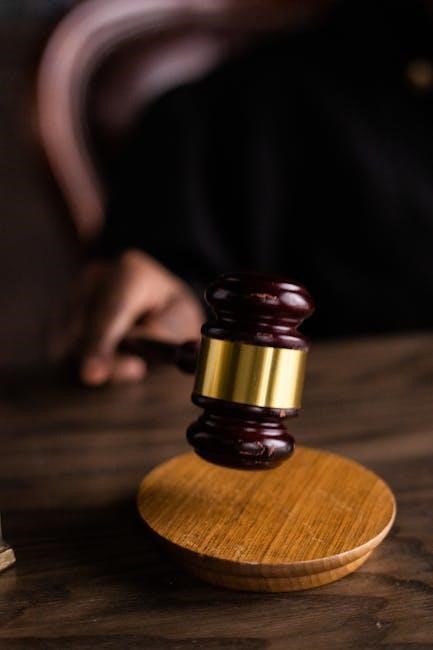The Brian Peck court transcripts provide detailed insights into the legal proceedings involving the former Nickelodeon employee‚ offering a primary source for understanding the case’s complexities and implications.
1.1 Overview of the Case and Its Significance
The case of Brian Peck‚ a former Nickelodeon employee‚ revolves around serious charges of lewd acts with a minor and sodomy‚ leading to significant legal and public scrutiny. The transcripts detail the allegations‚ legal proceedings‚ and testimonies‚ providing a comprehensive record of the trial. This case holds importance due to Peck’s prominent role in the entertainment industry‚ raising questions about accountability and safety in Hollywood. The transcripts also highlight the emotional support Peck received from colleagues‚ adding complexity to the narrative.
1.2 Importance of Court Transcripts in Understanding the Case
Court transcripts are crucial for understanding the intricacies of Brian Peck’s case‚ serving as a primary source of information. They provide verbatim accounts of testimonies‚ arguments‚ and evidence presented during the trial‚ ensuring transparency and accuracy. These documents reveal the legal strategies of both the prosecution and defense‚ as well as the emotional pleas from supporters like actor James Marsden. The transcripts also include letters from industry professionals‚ offering insights into the broader context and public perception of the case. They are essential for analyzing the legal and emotional dynamics at play.

Background of Brian Peck
Brian Peck was a former Nickelodeon employee‚ serving as a dialogue coach and actor‚ known for his work with child actors in the entertainment industry.
2.1 Early Life and Career in the Entertainment Industry
Brian Peck began his career in the entertainment industry as a dialogue coach‚ working closely with child actors to refine their performances. His early life details remain sparse‚ but his professional journey highlighted a focus on nurturing young talent. Peck’s role at Nickelodeon positioned him as a key figure in children’s programming‚ contributing to the development of several notable shows. His work behind the scenes and occasional on-screen appearances established him as a familiar name in the industry before his legal troubles arose.
2.2 Role at Nickelodeon and Notable Works
Brian Peck served as a prominent dialogue coach at Nickelodeon‚ where he worked on popular shows like All That and The Amanda Show. His role involved refining child actors’ performances‚ making him a key figure in the network’s success. Peck also contributed to other live-action series‚ showcasing his versatility in the industry. His work behind the scenes helped shape the tone and quality of Nickelodeon’s programming during its peak in the late 1990s and early 2000s.

Charges and Allegations Against Brian Peck
Brian Peck faced charges including lewd acts with a minor and sodomy‚ pleading no contest in 2004‚ leading to significant legal consequences and public scrutiny.
3.1 Nature of the Crimes and Legal Proceedings
Brian Peck was charged with multiple offenses‚ including lewd acts with a minor and sodomy. He pleaded no contest in 2004‚ avoiding a trial but facing significant legal consequences. The charges stemmed from allegations of inappropriate conduct with a child actor‚ leading to a guilty plea and subsequent sentencing. The legal proceedings were marked by detailed court transcripts‚ which outlined the evidence and testimonies presented. These documents provided a transparent record of the case‚ ensuring accountability and public awareness of the seriousness of the crimes alleged against Peck.
3.2 Key Evidence and Testimonies Presented in Court
The trial featured a handwritten note from Brian Peck to the victim‚ serving as pivotal evidence. An FBI agent testified‚ detailing the note’s contents and its significance in establishing intent. Additionally‚ 41 letters of support for Peck were submitted by industry professionals‚ including actor James Marsden‚ who pleaded for leniency. These testimonies and documents were scrutinized during the proceedings‚ influencing the court’s understanding of Peck’s character and the severity of the allegations brought against him.

Support for Brian Peck During the Trial
Industry professionals and friends‚ including actor James Marsden‚ wrote heartfelt letters and testified on Peck’s behalf‚ expressing support and urging leniency during the legal proceedings.
4.1 Letters and Testimonies from Industry Professionals
Notable figures like actor James Marsden and other entertainment professionals wrote heartfelt letters to the court‚ advocating for leniency and sharing personal anecdotes about Peck’s character. These testimonials highlighted his contributions to the industry and portrayed him as a caring individual‚ aiming to humanize him amid the allegations. The letters emphasized his positive impact on colleagues and the emotional distress a prison sentence would cause. This collective support underscored the complexity of public perception in high-profile cases‚ blending professional admiration with personal empathy.
4.2 Emotional Pleas from Friends and Colleagues
Friends and colleagues of Brian Peck delivered heartfelt pleas during the trial‚ expressing deep emotional support and vouching for his character. Many described him as kind and caring‚ emphasizing his positive impact on their lives and the entertainment industry. These personal testimonies aimed to present a multifaceted view of Peck‚ balancing the severity of the allegations with accounts of his compassion and dedication. The emotional appeals highlighted the personal toll a prison sentence would take on Peck and his relationships‚ adding a human dimension to the legal proceedings.

Sentencing and Its Aftermath

Brian Peck received a 25-year sentence‚ marking a dramatic end to his career. The verdict sparked widespread shock and divided reactions from the public and industry professionals.
5.1 Details of the Sentencing Hearing
Brian Peck was sentenced to 25 years in prison after emotional pleas from friends like actor James Marsden‚ who advocated for leniency. The court heard letters from 41 supporters‚ emphasizing Peck’s positive contributions to the entertainment industry. Despite this‚ the judge emphasized the severity of the crimes‚ prioritizing justice for the victim. The hearing was tense‚ with Peck’s legal team arguing for a reduced sentence‚ while prosecutors stressed the need for accountability. The sentence marked a dramatic end to Peck’s career and sent shockwaves through his professional network.
5.2 Public and Industry Reaction to the Verdict
The verdict sparked widespread shock and debate‚ with mixed reactions from the public and entertainment industry. While some expressed outrage over the severity of the crimes‚ others highlighted Peck’s contributions to Nickelodeon and the lives of child actors. Industry professionals‚ including former colleagues‚ grappled with reconciling his offenses with his professional legacy. The case fueled broader discussions about accountability and justice in Hollywood‚ particularly regarding child safety and workplace conduct. Nickelodeon distanced itself from Peck‚ emphasizing its commitment to safeguarding young talent.

Impact on Nickelodeon and the Entertainment Industry
The case led to heightened scrutiny of Nickelodeon’s internal policies and sparked industry-wide discussions on child safety and accountability‚ prompting stricter protocols to prevent future abuses.
6.1 Response from Nickelodeon and Other Networks
Nickelodeon faced intense scrutiny following Brian Peck’s conviction‚ leading to internal investigations and revised policies to ensure child safety. The network publicly condemned the actions‚ distancing itself from Peck. Other entertainment companies also reviewed their protocols‚ emphasizing stricter background checks and on-set monitoring. The case prompted industry-wide discussions on accountability and safeguarding minors‚ with networks committing to transparency and zero-tolerance policies for misconduct. This collective response aimed to rebuild public trust and prevent similar incidents in the future.
6.2 Broader Implications for Child Safety in Hollywood
The Brian Peck case has raised significant concerns about child safety in Hollywood‚ prompting calls for stricter safeguards and accountability. The revelations highlighted systemic gaps in protecting minors‚ leading to industry-wide discussions on better oversight. Public outrage and advocacy groups demanded more robust measures to prevent abuse‚ while some professionals argued for fair due process. The case underscored the need for transparency and accountability‚ pushing for reforms to ensure safer environments for child actors in the entertainment industry.

Unsealed Court Documents and Their Revelations
The unsealed court documents revealed letters of support for Brian Peck from industry professionals‚ while also detailing specific charges and evidence presented during the trial.
7.1 Key Findings from the Unsealed Documents
The unsealed documents revealed numerous letters of support for Brian Peck from entertainment industry professionals‚ including emotional pleas from friends and colleagues. These letters highlighted his character and contributions to the industry. Additionally‚ the documents detailed specific charges‚ including lewd acts with a minor and sodomy‚ with evidence such as handwritten notes and testimonies from key witnesses. The files also exposed the legal strategies of both the prosecution and defense‚ providing a comprehensive view of the case’s complexities and the court’s deliberations.
7.2 Media Coverage and Public Interest in the Documents
The unsealed court documents sparked significant media attention‚ with outlets like Investigation Discovery covering the revelations. Public interest surged‚ particularly on social media‚ as the case highlighted issues of child safety in Hollywood. The documents‚ including letters from industry professionals‚ fueled debates about justice‚ accountability‚ and the entertainment industry’s response to misconduct. The emotional pleas from actors like James Marsden added drama‚ making the case a focal point in discussions about ethics and legal transparency in high-profile trials.

Legal Process and Proceedings
The trial of Brian Peck involved a detailed timeline of legal milestones‚ including a guilty plea‚ sentencing‚ and key testimonies‚ with both prosecution and defense presenting their cases.
8.1 Timeline of the Trial and Key Legal Milestones
The trial of Brian Peck began with charges filed in 2003‚ including lewd acts with a minor and sodomy. In 2004‚ Peck pleaded no contest‚ avoiding further litigation. Key milestones included emotional testimonies from supporters like James Marsden and the presentation of 41 letters advocating for leniency. The sentencing hearing in 2004 marked a pivotal moment‚ with Peck receiving probation. In 2024‚ court documents were unsealed‚ revealing details of the case and sparking renewed public interest in the legal proceedings and their broader implications.
8.2 Role of the Prosecution and Defense
The prosecution presented evidence‚ including a handwritten note from Peck and testimony from an FBI agent‚ to build a case against him. They emphasized the severity of the charges and the need for accountability. The defense‚ supported by letters from industry professionals and friends like James Marsden‚ argued for leniency‚ highlighting Peck’s positive character and contributions. This contrast in strategies highlighted the legal battle’s emotional and factual dimensions‚ ultimately influencing the trial’s outcome and sentencing decision.

Public Reaction and Debate
9.1 Social Media and Online Discussions
Social media platforms saw intense debates about Brian Peck’s case‚ with hashtags like #JusticeForVictims and #HollywoodAccountability trending. Public opinion was divided‚ reflecting broader societal concerns about accountability in the entertainment industry. Online forums and communities actively discussed the case’s details‚ particularly after the unsealing of court documents‚ which sparked renewed interest and debate about child safety and legal transparency in Hollywood.
The release of Brian Peck court transcripts sparked widespread online debates‚ with users discussing the case’s troubling details and its implications for Hollywood. Social media platforms saw a surge in activity‚ as hashtags like #BrianPeck and #NickelodeonScandal trended‚ reflecting public outrage and demand for accountability. Many users shared their reactions to the transcripts‚ emphasizing the need for greater transparency in handling such cases. The emotional pleas from actors like James Marsden and the revelation of support letters added fuel to the fire‚ dividing opinions on justice versus leniency in high-profile cases.
9.2 Ethical and Moral Debates Surrounding the Case
The Brian Peck case has ignited intense ethical and moral debates‚ particularly regarding the support he received from industry professionals. Many questioned the morality of backing someone accused of such serious crimes‚ while others emphasized the importance of due process. The case highlights broader concerns about accountability in Hollywood and the need for stronger safeguards to protect minors. Public opinion remains divided‚ with some advocating for harsher penalties and others stressing the complexity of human behavior. These debates underscore the challenges of balancing justice with compassion in high-profile cases.
The Brian Peck case highlights the importance of accountability and transparency in addressing child safety in Hollywood‚ with court transcripts serving as a critical resource for understanding the legal and ethical implications.
10.1 Final Thoughts on the Case and Its Implications
The Brian Peck case underscores the gravity of accountability in Hollywood‚ particularly regarding child safety. The transcripts reveal a complex legal battle‚ highlighting the emotional toll on all parties involved. While supporters like James Marsden advocated for leniency‚ the unsealed documents exposed troubling details‚ sparking broader ethical debates. The case serves as a stark reminder of the entertainment industry’s need for stricter safeguards and transparency to protect vulnerable individuals. Its implications continue to resonate‚ urging systemic change to prevent future abuses and ensure justice for victims.
